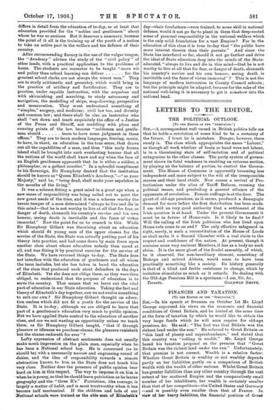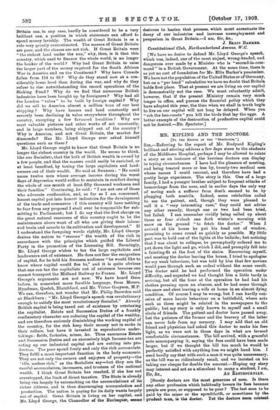FINANCES AND TAXATION.
[TO THE EDITOR OF THE " SPECTATOR.']
SIR,—In his speech at Swansea on October 1st Mr. Lloyd George expressed his views on the economic and financial conditions of Great Britain, and he hinted at the same time at the form of taxation by which be would like to obtain the very large funds which he will soon require for old-age pensions, Ste. He said : "The fact was that Britain was the richest land under the sun." He referred to Great Britain as "this land of plenty and superabundance," and stated that this country was "rolling in wealth." Mr. Lloyd George based his taxation proposal on the premiss that "Great Britain was the richest land under the sun." Unfortunately, that premiss is not correct. Wealth is a relative factor. Whether Great Britain is wealthy or not wealthy depends partly on her liabilities, partly on a comparison of British wealth with the wealth of other nations. Whilst Great Britain has greater liabilities than any other country through the vast extent of her scattered Empire and the comparatively small number of her inhabitants, her wealth is certainly smaller than that of her competitors—the United States and Germany —and is possibly even smaller than that of France. In view of her heavy liabilities, the financial position of Great
Britain can, in any case, hardly be considered to be a very brilliant one, a position in which statesmen can afford to epend money lavishly. The wealth of Great Britain is as a rule very greatly overestimated. The masses of Great Britain are poor, and the classes are not rich. If Great Britain were "the richest land under the sun," why, then, is it that this country, which used to finance the whole world, is no longer the banker of the world ? Why had Great Britain to raise the larger part of the money required for the South African War in America and on the Continent ? Why have Consols fallen from 114 to 85? Why do they stand now at a con- siderably lower level than during the war, and why do they refuse to rise notwithstanding the record operations of the Sinking Fund ? Why do we find that numerous British industries have been bought up by foreigners ? Why had all the London " tubes " to be built by foreign capital ? Why did we sell to America almost a million tons of our best shipping ? Why have houses and land constantly and severely been declining in -value everywhere throughout the country, excepting a few favoured localities ? Why are most valuable pictures and other works Of art constantly, and in large numbers, being shipped out of the country ? Why is America, and not Great Britain, the market for diamonds? Has Mr. Lloyd George ever asked himself questions such as these ?
Mr. Lloyd George ought to know that Great Britain is no longer the richest country in the world. Ile seems to think, like our Socialists, that the bulk of British wealth is owned by a few people, and that the masses could easily be enriched, or at least benefited, by taxing the large capitalists and land- owners out of their wealth. He said at Swansea : "He could nanie twelve men whose average income during the worst days of depression would suffice to maintain in comfort during the whole of one month at least fifty thousand workmen and their families." Continuing, he said : "I am not one of those who advocate confiscation, and, so far as I am concerned, honest capital put into honest industries for the development of the trade and commerce f this country will have nothing to fear from any proposal I shall ever be responsible for sub- mitting to Parliament; but I do say that the first charge on the great natural resources of this country ought to be the maintenance above want of all who are giving their labour and bpstin and muscle to its cultivation and development." If I understand the foregoing words rightly, Mr. Lloyd George desires the nation to " resume " the wealth of the rich in accordance with the principles which guided the Liberal Party in the promotion of the Licensing Bill. Seemingly, Mr. Lloyd George wishes to tax the large capitalists and landowners out of existence. He does not fear the emigration of capital, for he told his Swansea audience "he would like to know where capital would flee to," and it is quite obvious that one can tax the capitalists out of existence because one cannot transport the Midland Railway to France. Mr. Lloyd George's arguments are not new. We have heard them before, in somewhat more forcible language, from Messrs. Hyndman, Quelch, Bla.tchford, and Mr. Victor Grayson, M.P. We can, therefore, not wonder that Mr. Philip Snowden said at Blackburn : "Mr. Lloyd George's speech was revolutionary enough to satisfy the most revolutionary Socialist." Already British capital is being taxed out of existence by overtaxing the capitalist. Estate and Succession Duties of a frankly confiscatory character are reducing the capital of the wealthy, and are therefore seriously diminishing the working capital of the country, for the rich keep their money not in sacks in their cellars, but have it invested in reproductive under- takings : fields, factories, tnines, Ste. Thus enormous Estate and Succession Duties and an excessively high Income-tax are eating up our industrial capital and are cutting into 1:Pro- duction. The poor spend freely and only the rich accumulate. They fulfil a most important function in the body economic. They are not only the owners and enjoyers of property—the 'idle, useless rich," as the Socialists say—but they are the careful accumulators, increasers, and trustees of the national wealth. I think Great Britain has reached, if she has nob overstepped, the limit of direct taxation. The State is already being run largely by entrenching on the accumulations of it richer citizens, and is thus discouraging accumulation and production. The nation is paying for its daily wants largely out of capital. Great Britain is living on her capital, and Mr. Lloyd George, the Chancellor of the Exchequer, seem desirous to hasten that process, which must accentuate the decay of our industries and increase unemployment and pauperism in Great Britain.-1 am, Sir, &c.,
J. ELIAS BARKER.
Constitutional Club, Northumberland Avenue, W.C.
[We have no desire to defend Mr. Lloyd George's speech, which was, indeed, one of the most unjust, wrong-headed, and dangerous ever made by a Minister who is "second-in-com- mand" in a British Government. At the same time, there is as yet no sort of foundation for Mr. Ellis Barker's pessimism. We have not the population of the United States or of Germany, but on a "per head" calculation we have no doubt that Britala holds first place. That at present we are living on our capital is demonstrably not the case. We must reluctantly admit, however, that if the present Ministry remain very much longer in office, and pursue the financial policy which they have adopted this year, the time when we shall in truth begin to live on our capital will not long be delayed. When you "rob the ben-roosts" you kill the birds that lay the eggs. A better example of the destruction of productive capital could not be desired.—ED. Spectator.]















































 Previous page
Previous page